Mass Effect: Andromeda lead designer Ian Frazier on 'fulfilling the promise of Mass Effect 1'
More on combat, the new planetary exploration, and how Andromeda compares to Dragon Age: Inquisition and The Witcher 3.
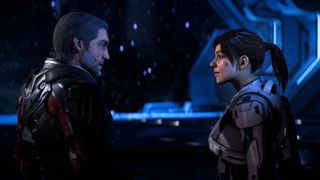
Andromeda is lead designer Ian Frazier's first Mass Effect game, but you wouldn't pick up on that by talking to him. He seems like he's been there all along when he talks about learning from the design of the first Mass Effect, or changing how we role-play conversations by removing the Paragon/Renegade system. He had tons to say about how Andromeda's new combat system allows for nuanced customization.
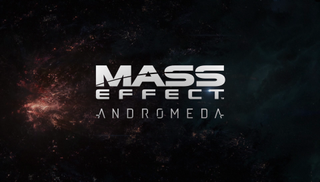
Check out our Mass Effect: Andromeda news hub for a collection of all things Andromeda, including our hands-on preview after three hours with the game.
After my recent hands-on with Mass Effect: Andromeda, I spoke to Frazier with a hundred questions running through my mind. What do you talk about when you've finally played a game five years in the making? A little bit of everything.
In our Q&A below, Frazier and I dug into the details of the new (seriously so much better) combat system, how characters will react to your dialogue choices, which Star Trek captain Ryder would be, and a ton more.
PC Gamer: I want to talk about what we've heard about the game so far, and what I've seen of it. In our newest issue of the magazine Mass Effect is the cover feature, and one of the things that stood out to me from our interview was this game, holistically, being less about the threat hanging over you, and more about the spirit of exploration, that sci-fi vibe that the first Mass Effect was really shooting for. In Andromeda you have this villain out there, the Archon. Can you talk about that balance—how much of this game is about that evil force, and how much is about going off and doing your own thing?
It's an interesting question. In general, with Mass Effect 1, you nailed it. In a lot of our internal documentation, our meetings early on, the big theme for the game was 'fulfill the promise of Mass Effect 1.' Take what was good about Mass Effect 1, and what it aspired to be, and go, well, it's been 10 years. What can we do to take that and deliver above and beyond what was even possible back then?
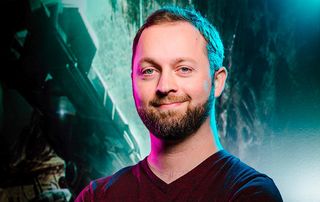
Lead designer Ian Frazier was previously the lead designer on fantasy RPG Kingdoms of Amalur: Reckoning.
In terms of the structure of the game, it is more open, and we do allow a lot more exploration. We didn't want to have you feeling, most of the time, 'DOOM IS AWAITING JUST OVER THE HILL, OH GOD!' We have some points that are like that. We want the stakes to be high. But we want that to be periodic beats along the plot, where it's like—'no really, man, go take care of that'—versus this constant, ever-present threat.
From a mechanical perspective we wanted you to explore, and craft, and see what's out there. And when the world's going to end in 20 minutes, you don't want to do that. We tried to have a mixture of short-term threats you need to deal with right now, and longer-term threats where you do get the sense that it's okay for me to go spend 20 hours exploring. [laughs]
Comic deals, prizes and latest news
Sign up to get the best content of the week, and great gaming deals, as picked by the editors.
If Ryder was a Star Trek captain, which one would be the closest analogue?
It's funny because there is no one answer. The idea of the tone system is very much for you to make that choice. If you choose casual, the bottom left option, very frequently, you're going to be kind of a Chris Pine Captain Kirk. If you choose the professional option on a regular basis, you're a mixture of Picard and, honestly, Shepard. If you choose the analytical option it's much more Picard-oriented with a bit of Spock mixed in. And if you choose the emotional option, it's a bit of Sisko, a bit of Kirk.
It's funny, because when we talk about things internally, it's like okay, is this the Picard option or the Spock option?
The flirt option is always Riker, by the way.
He does have sex with every alien.
If it's possible.
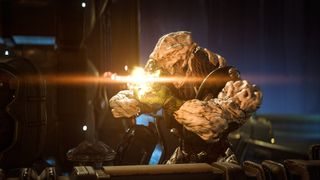
Talk about the ability progression through the game. As you put more points into them, do they just get stronger, charge faster, or is there more nuance to them?
Definitely more nuance. Some of it's just yes, +27% damage. But a lot of them are mechanically changing what's going to happen. As a simple example, there's an ability called biotic lance. One of the upgrades for that, I forget what the counter-option is but you can evolve it to do something, I think it's vastly improved headshot damage, or you can make it consume shields instead of having it cool down. So you really need to pay attention to your shields, because it's going to eat them every time you use it, but you can spam the heck out of it because you're not reliant on cooldown.
We have other things like that. Like incinerate, you can make it shoot two fireballs instead of one, or you can have one that's going to do something extra when it explodes. So you get more mechanical variance. Some of them are pretty substantial differences. It's really interesting to build different synergies as you create your character, especially if you include the squadmates.
As an example, I'm going to make the assault turret power from the tech tree and have that have an ability that primes enemies with cold, slowing enemies down and putting this chill cover on them. Then Cora, I'm going to make sure her biotic charge can happen a lot, the lowest possible cooldown, and make it a combo detonator. So I'm aiming Cora at whichever thing my turret has frozen. Cora, go blow that up. Cora, go blow that up. She's running around detonating those combos.
Especially if you combine yourself with the squad with potential constructs like the turret, it gets pretty crazy.
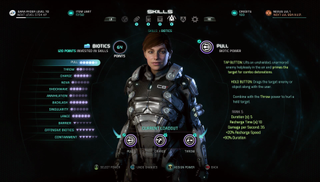
Can you plan your own synergies with your abilities? Like with lance, you can siphon your own shield to use it repeatedly. Is there an ability that offsets that, like recharging your shields quickly, or based on kills?
Exactly. So there's a combination of factors. In terms of just skills, let's set aside the other various bits and bobs of the game. With just skills, in that example, you could do a build—I've done this build—where you've got biotic charge as your main thing. You spec it heavily to regen your shields whenever you do it, and then take either nova or lance, both of them can be turned into things that thrive on shields. And you can do that, so you're ping-ponging between the thing that gives you shields and the thing that eats your shields. Just try to stay alive as you do that yo-yo.
How do all the different abilities play into the profile system?
It's kind of a complicated answer. At the beginning of the game you don't have any sense of class, but if you do choose to do character gen, you choose one of six backgrounds, or trainings, when the game starts. Now what that will do, is take certain abilities that are kind of higher level or specialized abilities, like charge or cloak that pretty significantly impact your gameplay. Normally we require you to invest several points in that tree before you can do it. If you want biotic charge, you have to have invested 9 points into something else on the biotic tree before you can get charge. But if you chose that background—there one where you are the guy that charges—then you have that available from the outset and you can immediately start spending points in it. So if you try the different backgrounds you'll see different things locked and unlocked in the trees.
But again, if you play long enough and invest in the right place, you can unlock anything. You can mix and match however you like.
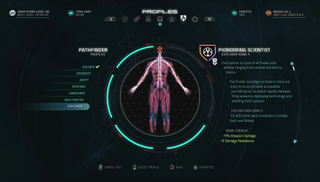
Now the profile system is the way that we let you get a sense of identity, and get a bonus related to a particular playstyle. So the basic example is this. I start the game, I use the default background which is kind of the soldiery background, and I spend every point I ever get on every level-up on the combat tree. If you do that, you're going to unlock a soldier profile which you can equip, that gives you bonuses to playing as a person who's all about guns. Reduced weapon weight with your guns, ability to carry more guns, more effective with your guns. There's a killstreak bonus, more guys killed under a certain amount of time, you get escalating damage for that. It's all about the guns.
Let's say you did that, kept ranking up your soldier profile, it's giving all these benefits. Well, I want to try biotics. Purple stuff is cool. So you invest in some biotic abilities. Now you'll unlock a couple more profiles. You'll unlock one that's an adept profile, that gives you bonuses to using biotics. And a vanguard profile, which is a hybrid of combat and biotics.
The profile system is the way we let you get a sense of identity and a bonus related to a particular playstyle.
Now they'll be lower-level, because you haven't invested as much across those two trees, but you'll have access to them. So now I'll try this vanguard profile. You can only have one profile active at a time. So I can switch over to vanguard, and now every time I punch something I get shields back. Okay, but it's not giving as good bonuses to my guns, so maybe I want to stick with that. Oh, but the adept one makes it so that every time you do a biotic combo, it leaves little echo combos, mini explosions that ripple out from the main one. So maybe that's better for your playstyle, because you've totally specced to be Mr. Combo.
But you try it for awhile and eh, don't care for it. You switch your profile back, whenever you like, even in the middle of combat. But which profiles you have available is limited to what you've spent points in. You can't just do any profile unless you've spent the points to unlock that.
In the previous Mass Effect games you had more of a limit on how much experience was available, because they were more linear. In this one you can go out into the open world and kill stuff, so if I played this game for 250 hours, is there a point where I have the ability to spec into everything?
It would take a long time, but it is technically possible. We don't actually have a level cap, so you could keep going until you have straight-up run out of things to spend points on, which should be around level 123.
So if you played soldier for 40 hours and decide I'm tired of this, and want to shift to a completely different playstyle...
You have a couple options there. One is: 'You know I like a lot of this but I want to try something new,' you can invest in something else and use a profile to gradually shift yourself that direction. If you're like 'nope, I hate this, what have I done, I've wasted my 40 hours,' you can go down to the medbay in the Tempest, and you can spend some money to completely respec, get all your points refunded, and completely rebuild your character. Every time you do that the cost goes up, so you don't want to do it constantly, but you can do a complete nuke from orbit if you want.
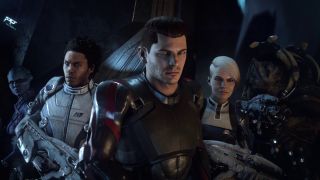
Along the same lines of choice, a lot of hardcore PC D&D RPGs focus on 'you can play this game killing every single NPC and somehow still beat it.' Or you can go the other way and play totally pacifist and talk your way out of every situation. This game starts with a pretty typical run-and-gun mission, where you kill the aliens on sight, save your people. What's the balance there? How much of it is the combat game, how much am I going to be able to talk my way out of?
I'd say it's similar to the trilogy, the average of the three games previously. There are cases where you can get out of combat entirely through dialogue, but we certainly don't have a pacifist non-lethal approach to the game. It's not designed for that. Generally speaking, there's the talky bit, and there's the shooty bit, and sometimes they'll cross over, but for the most part they're separate aspects of the game that are interwoven over the course of the experience.
It seems like the shift between might be quicker, or more common, compared to like Mass Effect 2, where you have a mission sequence where you're fighting, then a whole hub section.
The other thing is we have some other elements. If you look at Mass Effect, especially 2 and 3, there's the shooting part, and the talking part. The end. Now we've got a more robust galaxy map experience, exploring space is kind of a richer part of the game all by itself. I wouldn't say full-blown platforming, but you do have the jump jet and the climbing, you can do these explorative bits just trying to get up to somewhere cool, either on foot or in the car. We have some light puzzle aspects. We have things like the crafting system. I think you'll just see more variation in what you do over the course of the game than you would've seen in Mass 3, simply because there are more mechanics.
In Mass Effect 2 there were time-sensitive missions where if you didn't get to it by a certain point, you couldn't do it anymore. In this one I had the experience of going back to the Tempest, and they're like 'I heard about this thing over here...' Are any of those time-sensitive, or are they all open forever?
So there's nothing that's explicitly time-sensitive, but there are two things that are kind of in that vein. One is, there's a handful of quests that if you finish the main story, are no longer accessible. But it's a pretty small percentage. But the vast majority of the game, including the loyalty missions, Mass Effect-2 style, you can do even after you finish the main story. Most parts are still open.
The other thing we have is we have quest content that gets unlocked in a time-based manner, like 'okay, you've been to three different planets, it's time for you to find something new.' But it's not that your whole crew died because that many missions have passed, it's just more content is available to you. We do it to not drown you.
Let's talk more about the character stuff. Changing paragon/renegade is a pretty big shift. 30 hours into the game, what is my character going to look like if I've been generally sticking to one style of personality?
What you'll find, we let you switch whenever you want, so even if you've been playing for 40 hours, always making jokes, you're like 'nope, I'm serious now, hitting the Picard button,' we'll let you do that. But the game is tracking under the hood how much you've chosen those different options, and we build a little psych profile for you based on that. Now it's not that everybody you walk up to is like 'you're that guy that's always joking!' But it may come up in conversation, and particularly specific things you've chosen over the course of the game, may come back to haunt you in either a good way or a bad way. Folks will remember certain decisions. Not in a more systemic way, but literally this one specific decision's going to get referenced back at this point later.
We don't have a thing where it's like 'you could tell him to back down but you can't because you haven't paragoned enough.'
The other thing we have, to let you keep track of what sort of character you've built. In the codex, the codex at its core works the same as the trilogy, but there's a section at the top called The Journey So Far. What that does is track your particular experience, what's been happening with your Ryder, what are the main story decisions you've made, what kind of relationships have you formed with your family, squadmates, and crew, and some other key characters, and finally your psych profile, which is tracking 'okay, you have only ever taken the casual option every single opportunity.' Or 'you take every single interrupt or narrative action the moment they're available. You're super impulsive, super casual.'
It'll give you that clear feedback on what you've chosen to be. But it's purely there so you understand what you've made. It's not feeding back into a system somewhere else. So there's no sense that 'if you want to get the golden gun, you're going to need to take the serious option every time.' We're trying to keep it open.
In the original games, if you weren't renegade enough or paragon enough there would be points where you couldn't influence conversations or characters. How does that work now?
We have deliberately removed that. We wanted you to feel like, at any time—there are things you can't say if the story doesn't give you a reason to say it, like you haven't done that thing or met that person, therefore you don't have this option—but only cases like that where it would be nonsensical for you to have that option. We don't have a thing where it's like 'you could tell him to back down but you can't because you haven't paragoned enough.' That concept doesn't exist.
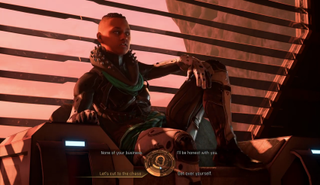
Is there anything along those lines? Like in a Fallout game, say, you have 7 points in charm and you can charm this asshole instead of trying to kill him. Is there any equivalent to that?
No, there's no dialogue skills in that sense. It's purely: you can choose what you want to say, and sometimes the specific choice that you've made, not systemically, but the specific choice you've made might piss someone off or cause repercussions. But it's not that you had 15 points in bribery. It's that you chose to try to bribe someone who was not a smart person to try to bribe. [laughs]
How does that nuance feed into character relationships? That was a big thing too, how characters would respond to you if you were very paragon or very renegade. If I'm tossing jokes all the time, how does that affect romance options, for example?
I don't think we have any that are straight-up shut off, like oop, you made too many jokes, therefore this person will not smooch you. But you certainly will see reactivity, particularly with key characters, when you lean heavily towards certain options. Or even in the moment. There's at least a couple spots in the game where it's a very serious moment and you can make a joke in that moment. Do you really want to? is that the best idea? You can, and you'll get reactions like you'd expect to get when you make jokes in that situation.
In the beginning when we looked at the default character profiles, you talked about having different representation in there. How does that extend to the rest of the game in terms of depictions of romances, relationships between the player character and the aliens, between genders?
We learned a lot from Dragon Age: Inquisition in that respect. Something that I think that team did very well was having a variety of different kinds of romances. And I mean that both in the sense of different sexual orientations, but also in how they're portrayed.
You had everything from Josephine, the Disney princess romance, to the explicitly sexual Iron Bull, and some other ones like that. We've tried to do something similar. We have sort of a range of different options, in terms of the tone, the feeling of the romances you can pursue, and also there are ones that are more like flings, and ones that are more serious, and ones that are flings that could be serious depending on the choices you make. So we tried to have that mix, in conjunction with, of course, making sure that really everybody is represented to an extent. There are gay romances in the game, there are bisexual romances in the game, and so forth.
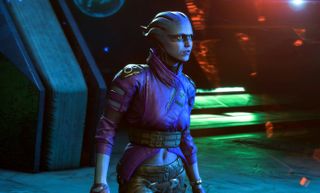
In our cover feature Bioware talked about more substantial sidequests, and they threw out Witcher 3 as a point of reference. What have you guys looked at since the Mass Effect trilogy came out, in terms of where RPGs have gone, that has played into this game at all? What you didn't or did want to do?
A lot of things. In terms of our own internal work, obviously we worked on Dragon Age for years, and we looked at how things went with Dragon Age. What was good, what was bad, what we could improve.
As far as the market goes, we played all the competitors, everything in the space. We played The Witcher, Fallout. We saw the things we liked and don't like. And just where the industry is right now. We try to use that to help guide us and what players are looking for and what we can do to make the best experience possible.
Where do you think the industry is right now?
For the RPG space, I think we are heading towards more quality over quantity. That doesn't mean you don't want to have quantity. You do. But I think particularly open world games were heading towards more and more and more filler-y, and I think there's a pushback on that now, rightly. People want more quality content. And they want quantity too! So you're always trying to find the right spot to peg that needle. So I think where we're looking, and where I imagine other games are looking right now, move the needle a bit in the direction of some more high quality rich content.
So Kadarra, the planet I'm on. I was just getting out into the open world. The thing I remember vividly about the first Mass Effect was the promise being amazing. The actual planets... pretty bland. Not that much fun to drive around. But the hub parts that you'd be on where awesome. There were just only four or five of them. How does this compare, having a more nuanced open world, having probably even more detailed hubs, I'm guessing. How many of those are we talking about that are going to be analogous to what we saw in Mass Effect 1?
I can't give numbers yet. I can tell you that, as far as other games we've looked at and so forth, what we looked at more in terms of how to build this than other open world games, is we actually did look at Mass Effect 1. We didn't want to feel like just another open world game. We tried to not even think of ourselves as an open world game. Open, yes. Explorative, yes. But not in that exact mold.
We instead looked at Mass Effect 1, examples like Novaria and said 'okay, if you built that now, and you could throw more time and money and energy at it than we could at the time, what would that look like?' Imagine a Novaria where you find a whole lot more than just driving from point A to point B, from the cool big hub to the other cool big hub.
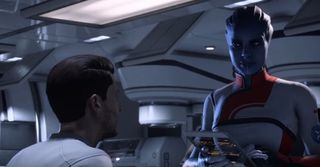
And that's essentially what the game is. You go to these UNC spaces, or uncharted worlds, and you'll have something like Kadarra Port, the actual city portion which has a lot of rich content, you go out there, you're going to go to this piece, and this piece, and this piece, that are other interesting places to explore, with varying degrees of stories crisscrossing that world as you go from A to B.
And we try to orient them. You'll see this if you skim through the journal in your current savegame. We try to arrange that content in a way that the player can tell what's light and what's heavy. If you look in the journal, the first section is critical path, the main story. The next section is big plot threads that run throughout the game and go to many different places and involve, often, key characters like your squadmates, crew, family, that let you explore some of the bigger mysteries and stories of the game.
Those are a huge deal. Then you have the Helios assignments which are bigger, meatier story quests across the various worlds, that are usually self-contained. So this is just Kadarra stuff. Do these things on Kadarra. Not always, but usually. And then we have additional tasks, so if it's like, I want some XP and loot, and don't erally care about getting involved in a deep story right now, the additional tasks are thsoe things. So we have kind of a clear message to the player so you know, what kind of content do you want? Here it is, go do these things.
Are there planets, unlike Kadarra, where it's like one of those procedurally generated Mass Effect 1 planets with newer technology? Where you land on this uncharted planet, just drive around, find some aliens and stuff.
There is a spectrum, there's none that are fully procedural. We had used some procedural tools in the generation of our terrains and such, but everything at this point is actually hand-crafted. We at an earlier stage in development were looking at more fully procedural stuff. We spent a lot of time with it. We experimented with it. Weren't super happy with the results.
Just hard to keep it interesting?
It really is. I'm not going to say it's impossible. It's not. Who knows, maybe we'll go back to it someday. But with this game, we just got a lot better results in terms of the story we wanted to tell when we handcrafted the experience.
So are there lighter planets that are not as dense with people as this? Yeah. There are places where you can't breathe. But as far as the way we built it, they're all built with the same sort of methodology as Kadarra.
Gotcha. So there is going to be that mix where, here's a planet with a city or a spaceport, and then, here's a planet where it's just, go find an outpost or some mountains.
Absolutely, yes.
Let's talk a bit about the voicework and animation. When the game trailer came out a few months ago a lot of people were like 'the lip synching doesn't look so great!' It looks pretty good, from what I've seen—I think it's expressive in a different way from some other recent games. It feels a tiny bit more cartoony than some other facial systems. Can you talk about where you are on that stuff, how you incorporated motion capture, and how you did aliens?
The first thing probably worth mentioning is we're still actively working on it. Since that video, and even now, we're continuing to polish and work on the lip sync and facial performances. Even through the day one patch we're still working on this to be as good as it possibly can be and dumping more time into it.
We're continuing to polish and work on the lip sync and facial performance. Even through the day one patch.
But as far as how we did it, the big difference between this and all the previous Bioware games, including even Inquisition, is we used performance capture for a lot of our critical scenes. When you see some of the opening parts of the game, where your dad makes his rousing speech, that's not just hand animated by an animator. That's motion capture on the guy in the lab with little ping pong balls on his face, so facial expressions are carefully captured. So you get more of that rich emotion coming through, in addition to the lip syncing and the movements and so forth.
Previous Bioware games, up to and including Inquisition, have always been body capture, and that's all. The face was all done by hand. Now we have a lot more of that human element captured throughout a lot of our key scenes.
And what about the alien expressions?
Actual Salarians with ping pong balls. Actual Krogan with ping pong balls. No, those are all done by hand. But I'm actually really—I'm not sure how much you've gotten to talk to the aliens yet—but really proud of what we've done with the facial rigs. When you talk to a Salarian you'll see his funky irises closing inside. It's actually pretty biologically compelling. It's believable as a living thing.

Wes has been covering games and hardware for more than 10 years, first at tech sites like The Wirecutter and Tested before joining the PC Gamer team in 2014. Wes plays a little bit of everything, but he'll always jump at the chance to cover emulation and Japanese games.
When he's not obsessively optimizing and re-optimizing a tangle of conveyor belts in Satisfactory (it's really becoming a problem), he's probably playing a 20-year-old Final Fantasy or some opaque ASCII roguelike. With a focus on writing and editing features, he seeks out personal stories and in-depth histories from the corners of PC gaming and its niche communities. 50% pizza by volume (deep dish, to be specific).
Most Popular


